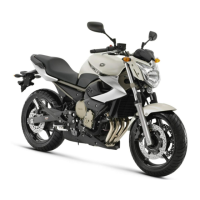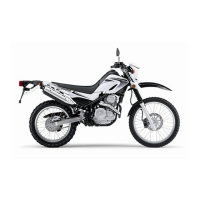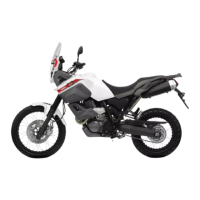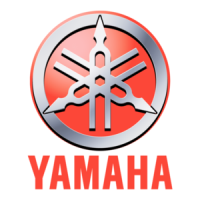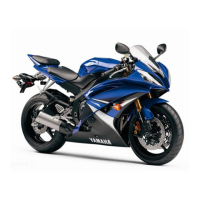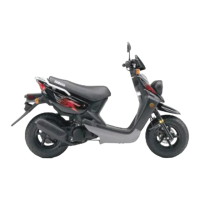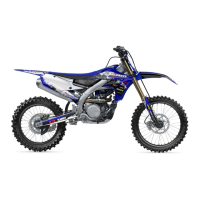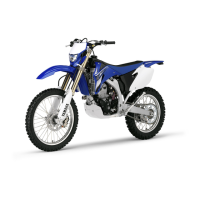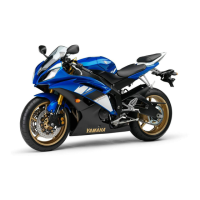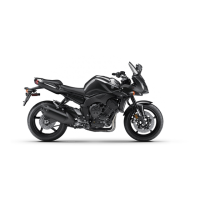Do you have a question about the Yamaha XJ6 2008 and is the answer not in the manual?
Explains symbols like WARNING, NOTICE, and TIP used in the manual.
Details cold tire pressure for different load conditions and riding speeds.
Covers owner duties, pre-operation checks, visibility, and skill limits.
Recommends helmets, face shields, jackets, boots, and gloves for rider safety.
Warns about dangers of carbon monoxide and proper ventilation.
Details maximum load and guidelines for distributing cargo to maintain stability.
Recommends using genuine Yamaha accessories for safety and performance.
Discusses potential safety hazards of non-genuine parts and modifications.
Advises on tire and rim selection for optimal performance and handling.
Identifies key components from the left side of the motorcycle.
Identifies key components from the right side of the motorcycle.
Illustrates and labels the main controls and instrument panel components.
Explains the vehicle's anti-theft immobilizer system and key usage.
Details the functions of the main switch and steering lock positions.
Describes how to lock the steering and the function of the parking position.
Explains the function of various indicator and warning lights on the instrument panel.
Shows how coolant temperature is displayed and what actions to take.
Explains engine trouble and immobilizer system indicator lights.
Introduces the components of the multi-function meter unit.
Explains the tachometer and how to set the clock.
Describes meter modes and fuel level indication.
Details coolant display and the self-diagnosis system for error codes.
Covers operation of left and right handlebar switches.
Explains horn, stop, start, hazard switches and clutch lever function.
Explains operation of shift pedal, brake lever, and brake pedal.
Instructions for fuel cap operation and safety during refueling.
Covers fuel spillage, recommended fuel type, and capacity.
Notes catalytic converter and provides seat removal/installation instructions.
Explains how to secure a helmet using the helmet holder and cable.
Details storage compartment and mentions handlebar adjustability.
Details how to adjust the rear shock absorber spring preload.
Explains sidestand safety and the ignition circuit cut-off system functions.
Critical checks for fuel, oil, coolant, and brakes before riding.
Covers checks for rear brake, clutch, throttle, cables, drive chain, wheels, pedals, levers, and sidestand.
Ensures chassis fasteners are tight and instruments/switches operate correctly.
Explains the conditions required for starting the engine and initial checks.
Details how to shift gears and the importance of using the clutch.
Tips for fuel saving and the engine break-in procedure for longevity.
Instructions on how to park the motorcycle safely, considering hot components.
Introduces periodic maintenance and the owner's tool kit for minor repairs.
Outlines maintenance intervals for emission control components.
Provides a comprehensive chart of regular maintenance tasks and intervals.
Instructions for removing and reinstalling body panels for maintenance access.
Explains how to check spark plugs for wear and engine condition.
Details spark plug gap measurement and tightening torque.
How to check engine oil level and replace the oil filter cartridge.
Step-by-step guide to changing the engine oil and filter.
Instructions for installing a new oil filter and tightening it correctly.
Specifies recommended engine oil type, grade, and additives.
How to check the coolant level in the reservoir.
Instructions for adding coolant to the reservoir and important warnings.
Step-by-step guide to draining and replacing the engine coolant.
Details antifreeze ratio, recommended coolant type, and quantities.
Instructions for removing and replacing the air filter element.
How to check and adjust the engine’s idle speed.
How to measure and adjust the throttle cable free play.
Notes that valve clearance requires dealer adjustment.
Covers tire pressure checks, wear inspection, and replacement advice.
Lists recommended tire air pressures for various load and speed conditions.
Lists approved tire sizes, manufacturers, and valve types.
Advises on checking cast wheels for damage and the importance of balancing.
How to check and adjust the clutch lever free play.
How to adjust the rear brake light switch for proper activation timing.
How to check front and rear brake pads for wear using indicator grooves.
How to check front and rear brake fluid levels.
Precautions for brake fluid and when to have it changed by a dealer.
How to check and adjust the drive chain slack for proper alignment.
Steps for cleaning and lubricating the drive chain using appropriate lubricants.
Instructions for checking and lubricating control cables.
How to check and lubricate the throttle grip and cable.
How to lubricate the pivots of the brake and shift pedals.
How to lubricate the pivots of the brake and clutch levers.
How to check and lubricate the sidestand pivot.
How to lubricate the swingarm pivots.
How to check the front fork for damage and smooth operation.
How to check for worn or loose steering bearings.
How to check front and rear wheel bearings for play or roughness.
Information on VRLA battery maintenance, charging, and safety.
How to locate, identify, and replace blown fuses.
Step-by-step guide to replacing the headlight bulb, with precautions.
Instructions for replacing the tail and brake light bulbs.
How to replace a turn signal light bulb.
How to replace the license plate light bulb.
How to replace an auxiliary light bulb.
Methods for safely supporting the motorcycle for maintenance.
Steps for removing the front wheel.
Steps for removing the rear wheel.
Steps for installing the rear wheel.
Introduces troubleshooting procedures for common problems.
Guides for diagnosing and resolving starting issues (fuel, compression, ignition, battery).
Diagnoses and solutions for engine overheating issues, focusing on coolant.
Advises on proper cleaning products for matte finish parts.
General advice on cleaning the motorcycle, including warnings about chemicals and pressure washers.
Guidance for cleaning after specific conditions like rain or salt spray.
Tips on preventing corrosion and minor paint damage.
Advice for short-term and long-term storage to protect the motorcycle.
Steps to protect the engine cylinders and parts during long-term storage.
Lists overall dimensions, seat height, wheelbase, ground clearance, and weight.
Details engine type, displacement, oil type, grade, and quantity.
Provides gear ratios, frame type, caster angle, and trail information.
Lists tire sizes, manufacturers, wheel types, and rim sizes.
Details brake types, operation, fluid, and suspension components.
Covers ignition, charging, battery model, voltage, and capacity.
Details headlight, bulb types, indicator lights, and their specifications.
Lists the amperage ratings for all fuses in the vehicle.
Explains how to find and record key and vehicle identification numbers.
Where to find the model label and its importance for ordering parts.
Information on regulations regarding tampering with the noise control system.
| Brand | Yamaha |
|---|---|
| Model | XJ6 2008 |
| Category | Motorcycle |
| Language | English |
